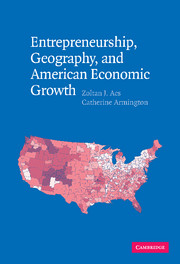Book contents
- Frontmatter
- Contents
- List of Tables and Figures
- Preface
- 1 Introduction
- 2 Entrepreneurship, Geography, and Growth
- 3 Regional Variation in Entrepreneurial Activity
- 4 Human Capital and Entrepreneurship
- 5 Entrepreneurship and Employment Growth
- 6 Summary and Theoretical Insights
- 7 A Formulation of Entrepreneurship Policy
- Appendix A: Firm Formation and Growth Data from the Longitudinal Establishment and Enterprise Microdata (LEEM)
- Appendix B: 1995 + 1996 Firm Formation Rates for U.S. Labor Market Areas with 1994 Labor Force and Establishments
- Appendix C: Service Industry Standard Industrial Classification (4-digit SIC) Codes and Their Subsectors, with 1995 Establishment and Employment and Changes to 1998, and 1996 through 1998 Firm Formations per 100 Establishments in Subsector in 1995
- Appendix D: 1991–1996 Employment Growth Rates and Share of High-Growth Establishments in Labor Market Areas, with 1991 Employment, Establishments, and Population, and 1991–1996 Population Growth and Relative Employment Growth Rates
- References
- Index
4 - Human Capital and Entrepreneurship
Published online by Cambridge University Press: 31 July 2009
- Frontmatter
- Contents
- List of Tables and Figures
- Preface
- 1 Introduction
- 2 Entrepreneurship, Geography, and Growth
- 3 Regional Variation in Entrepreneurial Activity
- 4 Human Capital and Entrepreneurship
- 5 Entrepreneurship and Employment Growth
- 6 Summary and Theoretical Insights
- 7 A Formulation of Entrepreneurship Policy
- Appendix A: Firm Formation and Growth Data from the Longitudinal Establishment and Enterprise Microdata (LEEM)
- Appendix B: 1995 + 1996 Firm Formation Rates for U.S. Labor Market Areas with 1994 Labor Force and Establishments
- Appendix C: Service Industry Standard Industrial Classification (4-digit SIC) Codes and Their Subsectors, with 1995 Establishment and Employment and Changes to 1998, and 1996 through 1998 Firm Formations per 100 Establishments in Subsector in 1995
- Appendix D: 1991–1996 Employment Growth Rates and Share of High-Growth Establishments in Labor Market Areas, with 1991 Employment, Establishments, and Population, and 1991–1996 Population Growth and Relative Employment Growth Rates
- References
- Index
Summary
Introduction
This chapter extends research reported in the previous chapter, which focused on firm formation in six sectors: distributive, manufacturing, business services, extractive, retail trade, and local market. The current chapter focuses on the rapidly growing service sector and subsectors of service industries, which are defined by their founders' educational requirements and their primary markets.
Since the mid eighties, the role of education and human capital externalities has been recognized as a key variable in theories of economic growth. Lucas (1988) emphasizes that the economies of metropolitan areas are a natural context in which to understand the mechanics of economic growth, and an important factor contributing to this growth is the catalytic role of human capital externalities within the cities. While the benefits of human capital to individuals have been extensively studied, economists are now realizing that individuals do not capture all of the benefits from their own human capital. Some benefits spill over to their colleagues and observers – through discussion, example, publications, and positive attitudes toward change, risk, and new knowledge.
Several interesting findings provide some groundwork for this chapter. First, Rauch (1993) finds that cities with higher average levels of human capital also have higher wages and land rents. Second, Glaeser, Scheinkman, and A. Shleifer (1995) find that for a cross section of cities, a key economic determinant of growth is level of schooling, just as has previously been found for countries.
- Type
- Chapter
- Information
- Entrepreneurship, Geography, and American Economic Growth , pp. 76 - 107Publisher: Cambridge University PressPrint publication year: 2006



